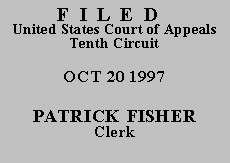

| WILLIAM RAYMOND JACKSON, |
|
Before SEYMOUR, Chief Judge, PORFILIO and MURPHY, Circuit Judges.
William Jackson appeals the district court's dismissal of his Bivens suit. In his complaint, Jackson alleged that he was improperly denied prison employment and longevity benefits when he was transferred to a high security prison for disciplinary reasons unrelated to his prison employment.
The district court dismissed Jackson's suit as frivolous and for failure to state a claim upon which may be granted. 28 U.S.C. § 1915(e)(2)(B). The district court found that Jackson's due process claim failed because he did not have a constitutionally-based liberty interest in prison employment, Templeman v. Gunter, 16 F.3d 367, 370 (10th Cir. 1994), and the prison policies and regulations relating to prison employment did not create a liberty interest. Sandin v. Connor, 115 S. Ct. 2293, 2295 (1995); Penrod v. Zavaras, 94 F.3d 1399, 1407 (10th Cir. 1996). The district court concluded that Jackson's equal protection argument failed because Jackson did not allege that he was treated differently than any other similarly situated inmates and, even if he had made such an allegation, Jackson had not demonstrated that any differing treatment was not reasonably related to some legitimate penological purpose. Finally, as to Jackson's claim that the retroactive application of a new prison policy to deny him longevity benefits, the district court noted that because the prison policy was not intended to be punitive, Jackson's claim must fail. Dyke v. Meachum, 785 F.2d 267, 268 (10th Cir. 1986) (per curiam).
This court has reviewed Jackson's briefs and contentions as well as the entire record on appeal. Based on that review, we affirm for substantially the reasons set forth in the district court's well-reasoned order dated March 18, 1997. We further find that this appeal is frivolous or fails to state a claim under 28 U.S.C. § 1915(e)(2)(B) for purposes of counting "prior occasions" under 28 U.S.C. § 1915(g).
The judgment of the United States District Court for the District of Colorado is hereby AFFIRMED.
ENTERED FOR THE COURT:
Michael R. Murphy
Circuit Judge
*. This order and judgment is not binding precedent, except under the doctrines of law of the case, res judicata and collateral estoppel. The court generally disfavors the citation of orders and judgments; nevertheless, an order and judgment may be cited under the terms and conditions of 10th Cir. R. 36.3.